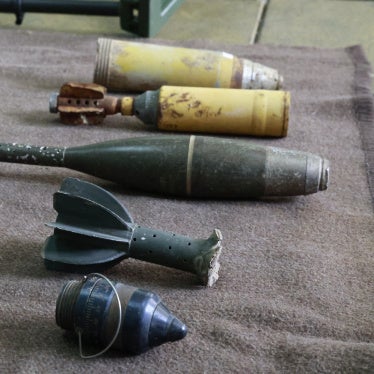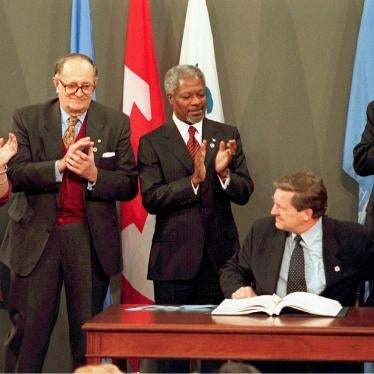Thank you, Mr. President,
Let us begin by congratulating Belize and the Republic of Congo for becoming the two most recent States Parties. What a great way to start our Meeting! And let us say how pleased we are to be here in San Jose, especially because of the vital leadership role that Costa Rica has played since the beginning of the Oslo Process and throughout the life of the Convention.
Mr. President, there is one clear message we think should emerge from this 5th Meeting of States Parties: the Convention on Cluster Munitions is working. It is gathering strength every year, and having a real humanitarian impact. Countries are destroying tens of millions of explosive submunitions from stockpiles, clearance operations are returning land to productive use, and the needs of victims are being better met.
With Belize and Congo, 114 nations are now part of this Convention, and 86 are States Parties. With every new member the powerful global norm emerging against these devastating weapons is strengthened. Even those not yet onboard the Convention have spoken out to condemn the recent use of cluster munitions in Syria, Ukraine, and South Sudan.
But, as we move toward the First Review Conference, we must do more to fulfill the promise and potential of the Convention. First and foremost, universalization efforts should be greatly expanded, more systematic, especially at high diplomatic levels, and better coordinated among all actors. Universalization of the Convention is the highest priority of the Cluster Munition Coalition. It should be a higher priority for virtually every State Party as well; you can all do better. You all know that promoting universalization is a legal obligation under Article 21, but it is worth emphasizing that the reason for that is the long-term humanitarian impact of universalization.
Every signatory state should be able to ratify by the Review Conference. There could also easily be a handful or more of accessions by that time. We believe that every country in the world can join and should join; it is a question of prioritizing the protection of civilians.
Last week we released our annual Cluster Munition Monitor report. We appreciate the many favorable references to the Monitor these last two days, and the widespread use of our facts and figures. The report found that states are making strong progress toward eradicating cluster munitions and addressing consequences of past use.
As of July, 22 States Parties had destroyed more than 1.16 million stockpiled cluster munitions containing nearly 140 million submunitions, which represents the destruction of an impressive 80% of all cluster munitions and 78% of all submunitions declared as stockpiled. Four States Parties completed stockpile destruction in the reporting period: Chile, Denmark, FYR Macedonia, and the United Kingdom. We congratulate them and note that they all destroyed their stocks as soon as possible, in keeping with the treaty’s language, rather than waiting until the deadline.
During 2013, 10 States Parties destroyed more than 130,000 cluster munitions and 24 million submunitions. A number of former major stockpilers have indicated they will complete stockpile destruction in advance of the deadline, including Sweden in 2014, and Germany and Japan in 2015.
On clearance, during 2013, at least of 30km2 of land was cleared of unexploded submunitions, resulting in the destruction of more than 54,000 submunitions and return of land back to communities in the six most contaminated states--Bosnia and Herzegovina, Cambodia, Iraq, Lao PDR, Lebanon, and Vietnam--as well as many other countries and regions. We urge all affected states to act quickly to clear their land of cluster munitions. We believe that with a few exceptions all states should be able to complete clearance in five years or less.
The Convention on Cluster Munitions continues to set the highest standards for victim assistance in international humanitarian law; in 2013, even the two non-signatory states with the most cluster munitions victims (Cambodia and Vietnam) continued reporting their efforts. All States Parties with cluster munition victims provided some services and nearly all States Parties have acted in accordance with the time-bound actions of the Vientiane Action Plan. In addition, there were measurable improvements in the accessibility of services in many States Parties.
However, services remain a far cry from being adequately available, particularly for survivors in remote and rural areas. We urge states to take further steps to ensure required services are accessible to all victims.
States Parties have continued to contribute to mine action, including cluster munition clearance, at a high level. The CMC has stressed that all States Parties are in a position to contribute in some way. It need not be financial resources, but rather shared experiences and technical advice, as seen in triangular cooperation and South-South cooperation. States needing support can also contribute in many ways. Affected states and donors should work together as partners.
We echo the concerns expressed by a number of States Parties about the disturbingly low rate of transparency reporting, and in some cases the low quality of reporting. Transparency reporting is of course a legal obligation. In addition to its value in tracking progress and problems in implementation, it allows states to identify their needs. Thus, reporting is in the self-interest of States Parties.
The CMC believes that all States Parties should enact comprehensive national legislation to enforce the Convention’s provisions and provide binding, enduring, and unequivocal rules. We welcome the workshop held Monday aimed at promoting such legislation in African nations. Thus far, a total of 22 States Parties have enacted national legislation, and another 19 are in the process of drafting, considering, or adopting it. Twenty-six states parties view other, more general national laws as sufficient to enforce the convention’s provisions.
Legislation should address the critical interpretive issues that have arisen regarding certain provisions of the Convention. It should prohibit any form of assistance with banned activities in all circumstances, including during joint military operations with non-signatories. It should also specify that it is unlawful for a country to be the host for stockpiles from other countries, to allow transit of cluster munitions across national territory, or to invest in producers of cluster munitions. If these issues are not addressed in legislation, they should be addressed through national policies.
In contrast to the positive news about implementation of the Convention by States Parties, the CMC continues to be deeply concerned by the extensive use of cluster munitions by Syrian government forces causing numerous civilian casualties. In 2013 alone, at least 1,000 cluster munition casualties occurred in Syria, by itself higher than any annual global casualty total since Cluster Munition Monitor reporting began in 2009. There have been hundreds of new victims in 2014. The vast majority of those killed—97 percent—were civilians. To make matters worse, Human Rights Watch reported on Monday about the first known use of cluster muntions by the Islamic State in Syria.
In addition to Syria, there was new use of cluster munitions in South Sudan and Ukraine in 2014, but it is not yet clear who was responsible. Use appears to be ongoing in Ukraine.
Any user of cluster munitions is knowingly putting civilians’ lives at risk, and we strongly condemn their acts. More than 140 states have condemned Syrian government use in statements and resolutions, including 51 states not party to the Convention on Cluster Munitions. We call on all states to speak out and condemn use in Syria as well as in South Sudan and Ukraine. We thank those that have already done so and note that the vast majority of states speaking the last two days have condemned ongoing use.
In closing, Mr President, the CMC stands ready, as always, to continue to work in partnership with you all to protect civilians from the unacceptable harm caused by these illegitimate weapons.
Thank you.








